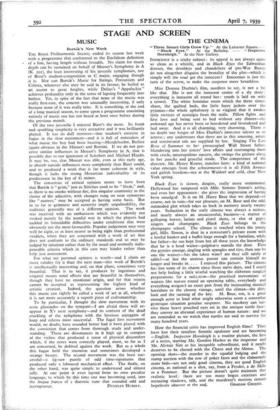STAGE AND SCREEN
MUSIC
BartOk's New Work
THE Royal Philharmonic Society ended its season last week with a programme that conformed to the Euclidean definition of a line, having length without breadth. No claim for much depth can be sustained on behalf of Mozart's Symphony in A (K. 2o1), the least interesting of his juvenile symphonies, nor of Bizet's student-composition in C major, engaging though it is. Nor can Bartok's Music for Strings, Percussion and Celesta, whatever else may be said in its favour, be hailed as an ascent to great heights, while Delius's " Appalachia " achieves profundity only in the sense of lapsing frequently into bathos. Yet, in spite of the fact that none of the music was really first-rate, the concert was unusually interesting, if only because none of it was really trite. It is something, at the end. of a long musical season, to come upon a programme consisting entirely of music one has not heard at least once before during the previous month.
Of the two juvenilia I enjoyed Bizet's the more. Its frank and sparkling simplicity is very attractive and it was brilliantly played. It has its dull moment—that student's exercise in fugue in the slow movement—and it is full of reminders of what music the boy had been hearing—Mendelssohn, Berlioz (quite obvious in the Minuet) and Rossini. If we do not per- ceive similar influences in Mozart's Symphony in A, that is possibly due to our ignorance of Schobert and Michael Haydn. It may be, too, that Mozart was able, even at this early age, to absorb outside influences more completely than Bizet could, and so produced a work that is far more coherent in style, though it lacks the strong Mozartian individuality of its predecessor in the key of G minor.
The consensus of critical opinion seems to have been that Bartok is " grim," just as Sibelius used to be " bleak," and, as there is no smoke without fire, this singular unanimity in the choice of the adjective, with changes rung on near synonyms like " austere," may be accepted as having some basis. But in so far as grimness and austerity imply unpalatability, the audience generally was of a different opinion. The work was received with an enthusiasm which was evidently not evoked merely by the manful way in which the players had tadded its formidable difficulties under conditions that were obviously not the most favourable. Popular judgement may very well be right, or at least nearer to being right than professional verdicts, when they are concerned with a work of art that does not conform to the ordinary standards and so may be judged by intuition rather than by the usual and normally indis- pensable criteria which in this case may hinder rather than help just assessment.
For what my personal opinion is worth—and I claim no more validity for it than the next man—this work of Bartok's is intellectually interesting and, on that plane, sometimes very beautiful. That is to say, it produces by ingenious and original means tonal effects that are beautiful in themselves, though they have no emotional origin, and for that reason cannot be accepted as representing the highest kind of artistic creation. Indeed, the question arises whether this music can rightly be called a work of art at all, whether it is not more accurately a superb piece of craftsmanship.
To be particular, I thought the slow movement with its eerie glissandos on the tympani—I am afraid these will re- appear in X's next symphony—and its contrast of the dead crackling of the xylophone with the luscious arpeggios of harp and celesta most successful. The fugal first movement would, no doubt, have sounded better had it been played with the conviction that comes from thorough study and under- standing. There are dissonances in it high up in compass of the violins that produced a sense of physical discomfort which, if the notes were correctly played, must, so far as I am concerned, be debited against the work. But as a whole this fugue held the attention and sometimes developed a strange beauty. The second movement was the least suc- cessful—a jig-saw puzzle of odd time-signatures that produced only a laboured mechanical effect. The finale, on the other hand, was quite simple to understand and almost jolly. At one point it even lapsed from its own peculiar language, to which by this time one was becoming used, into the lingua franca of a diatonic tune that sounded odd and










































 Previous page
Previous page